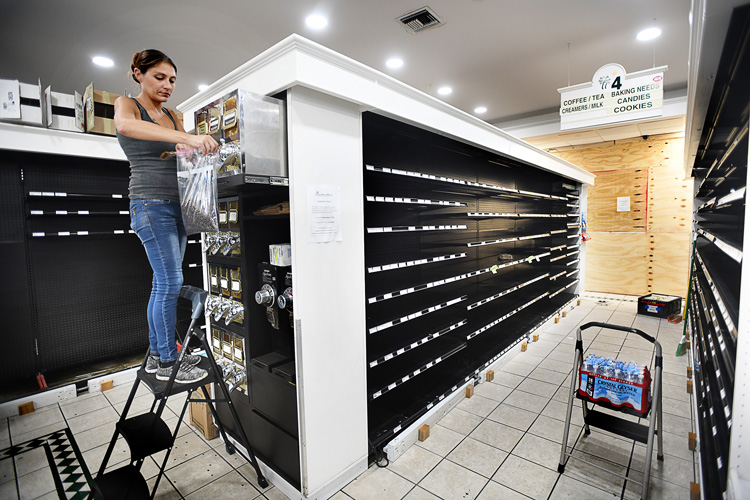
The Village Beach Market closed earlier this week to embark on the second phase of a $2.5 million remodeling project that store owner Jason Keen hopes will be completed by early October.
In the meantime, Keen said the market will operate an on-site food truck that offers a “limited menu of signature items from our deli” for breakfast and lunch, adding, “We’re hoping to be able to do dinner entrees, too.”
The market, located on State Road A1A on the northern tier of Vero Beach, also is planning to offer its customers curbside pickup service for pre-ordered groceries that will be stored in an off-site facility during the renovation.
“This will allow us to continue to serve our customers and community while the store is closed for the remodel,” Keen said. “It also provides an opportunity for our employees to continue working.”
Keen is undertaking the renovations after a busy summer, during which his business thrived despite the pandemic.
The project is the second major renovation of the market, which has operated in its current location for 40 years and underwent its first remodel in 1998.
Keen said work on the second phase of the current project began in late July, but the demolition involved sections of the store customers don’t see. Since the market closed its doors Monday, workers have begun gutting the building’s interior.
“It’s a complete remodel,” he said. “From floor to ceiling, it’s all coming out, and the walls are being stripped to the concrete. We’re also putting in a new refrigeration system. The old one was in for 22 years, and there have been a lot of changes in [Environmental Protection Agency] regulations over the years.
“It’s tough to be closed for seven or eight weeks, but when we’re done, it’s essentially going to be a new store,” he added. “Customers will immediately notice a brighter, fresher feel with a new layout – we’re moving the checkout registers at the front – and they’ll be greeted by a more open and welcoming entry.
“It’s still a cozy market, but it’ll feel a lot more airy and look a lot nicer.”
The work is being done by Anchor Construction, a Tampa-based company that specializes in commercial and retail construction, expansions and renovations.
Keen said he initially hoped to begin the project last month, but the coronavirus pandemic – specifically the U.S. Small Business Administration’s Paycheck Protection Program – created paperwork backlogs that impacted his construction loan application process.
“We’re about four weeks behind my original schedule,” he said. “Right now, we’re looking to reopen the first week in October. We want to be back before the season hits.”
The first phase of the project, which began last September and was completed in late October, involved resurfacing the parking lot and loading zone, improving drainage, installing large underground propane tanks needed to fuel a new generator, adding gas lines to accommodate an expanded kitchen, and replacing stucco and repairing water damage on the building’s exterior walls.
“We needed the new propane tanks so we could install a generator capable of providing power to the entire store, especially our refrigerators,” Keen said. “The old generator didn’t give us enough power to keep our refrigeration system going during hurricanes or other storms, or when there was a power outage.
“Then, while doing the outdoor work, we noticed water damage under the stucco and had to re-do all of the stucco.”
The project’s first phase was delayed, too, forcing Keen to postpone the second phase until this summer.
Keen said the death of his father, Jerry, in April 2019 required him to re-apply for the loan needed to pay for the renovations, because ownership of the market had to be legally transferred to him. The loan also was in his father’s name.
The market, which remained open during most of the exterior work, closed for only one week in September – after Hurricane Dorian blew past Vero Beach.
As for closing for nearly two months for the second phase, Keen said the market has done well during the COVID-19 pandemic.
“We’ve been very blessed that we were able to stay open and serve the community during a difficult time,” Keen said. “We were extremely busy the first three week after everything shut down in March and John’s Island closed its food service. That really added to our numbers.
“Of course, our operating costs went up because the supply chain of some products was disrupted by the pandemic,” he added. “There was also the cost of all the additional cleaning procedures we implemented to fend off the chance of infection.”



